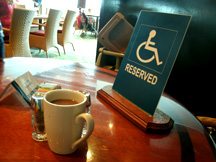I’ll admit it, I’m hopelessly biased, but my son is a world-class Mr. Coffee expert. Kevin regularly travels to three different continents in search of relationships with farmers growing excellent coffee he can roast and sell in his San Francisco café. Over the years he has shared his coffee knowledge (and bags of really really good coffee) with my husband and me. We now know the difference between utilitarian commodity coffee that is just a caffeine delivery system, and the complex flavors of a cup of specialty coffee that stands alone even without cream or sugar. For Christmas, he gave us the perfect coffee-making setup to take with us on a cruise, assuring us that we would have the best coffee on the ship.
 Unfortunately, the fancy new hotpot for heating water was too fancy for the fire-conscious security officers, and they confiscated it during the cruise. So we tried drinking the ship’s coffee, but much of the time it tasted like it had been prepared by someone who doesn’t understand the importance of proportion between coffee grounds and water. One day I took a picture at breakfast to commemorate the day I absolutely could not drink the abysmally wretched beverage they called coffee. I’m just not that picky. I now have an “educated palate,” but I’m not a picky person. Unless someone really crosses a line. And they did.
Unfortunately, the fancy new hotpot for heating water was too fancy for the fire-conscious security officers, and they confiscated it during the cruise. So we tried drinking the ship’s coffee, but much of the time it tasted like it had been prepared by someone who doesn’t understand the importance of proportion between coffee grounds and water. One day I took a picture at breakfast to commemorate the day I absolutely could not drink the abysmally wretched beverage they called coffee. I’m just not that picky. I now have an “educated palate,” but I’m not a picky person. Unless someone really crosses a line. And they did.
Now that I’ve been taught about coffee complexity and the role of terroir (the soil and climate where coffee is grown, just like with vineyards), I taste and appreciate coffee differently. It occurred to me that something similar, but far more important, happens to our thinking when we are taught biblical truth and values. Once our eyes are opened to God’s perspective and His presentation of truth, it changes how we process what we see and hear.
And, like developing a cultured palate for great (or not-so-great) tasting coffee, we develop discernment in spotting truth (or not-so-true) and error.
For example, I just received a phone call from someone who found me online and called to bounce some ideas off me. He said he thinks he’s the Messiah because he has made several predictions that have come to pass over the past couple of years. I told him that he can’t be the Messiah since the angel told the disciples that Messiah Jesus would return to earth the same way He left, through the sky and the clouds (Acts 1:11). And the Messiah is sinless and perfect, and since he is a sinner, he can’t be the Messiah. I asked him what he was reading and studying in God’s word, and he said that right now he’s reading the Book of Enoch. I told him that Enoch was written by man, not supernaturally inspired by God, so it’s not scripture. He needs to be reading and studying God’s word, not man’s word.
It’s knowing God’s word that allows me to compare this young man’s thoughts to the truth of God and explain where his thoughts and feelings, while they feel right and true, are off base. As C.S. Lewis wrote, “A man does not call a line crooked unless he has some idea of a straight line.” When we have the “straight line” standard of God’s word, we can identify what crooked is.
Someone else recently expressed his understanding of the Trinity as “There’s Father God, then Jesus is God as a human being, and the Holy Spirit is God in our hearts.” He thought the Trinity was different expressions of God as He related to us. Because of having received good teaching and good Bible study skills, I was able to compare his thoughts to how the Bible reveals truth about the three-Personed God: eternally existing, before there was a universeFather, Son and Spirit loving and adoring and delighting in each other totally apart from us. (Gen. 1:1-2, Eph. 1:3, John 17:5) The Trinity existed forever, long before there were people.
It’s nice to be able to tell the difference between great coffee and good coffee and dreadful coffee, but it’s far more important to be able to tell the difference between spiritual truth and error, between wisdom and foolishness, between God’s thoughts and man’s thoughts.
By the way, we finally figured out that we could have room service bring us a carafe of steaming hot water, which I poured over our wonderful coffee grounds to make what was still the best coffee on the ship.
This blog post originally appeared at blogs.bible.org/engage/sue_bohlin/on_coffee_drinking_and_thinking on January 16, 2016.